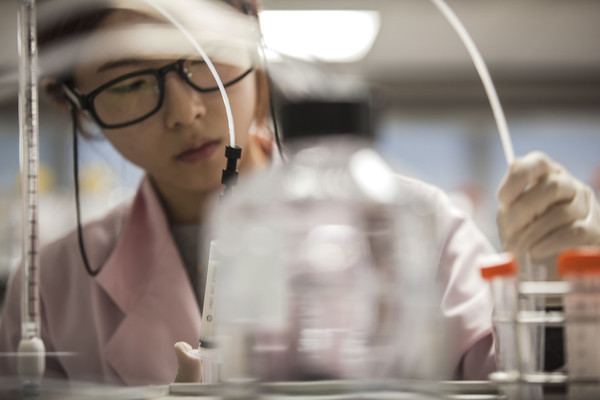Korean manufacturers of biosimilars have begun conducting global trials to expedite commercializing their pipelines.
Their moves are part of the preparation to release biosimilars referencing original blockbuster drugs such as Stelara (ustekinumab), Prolia (denosumab), and Avastin (bevacizumab), which are soon to lose patents.
Some of the biosimilar makers not only launched trials but disclosed the schedule for a market release, driving up more R&D competition for biosimilars.

Dong-A ST recently announced that it won approval from the U.S. FDA to conduct a phase-3 study of DMB-3115, an investigational treatment for chronic plaque psoriasis.
DMB-3115 is a biosimilar of Janssen’s autoimmune disease drug Stelara. Dong-A Socio Holdings and Meiji Seika Pharmaceutical have jointly developed DMB-3115 since 2013.
In July last year, Dong-A Socio Holdings transferred the rights of development and commercialization of the drug to Dong-A ST. Now, Dong-A ST and Meiji Seika Pharmaceutical are working on the drug.
The global phase-3 trials will test DMB-3115 using clinical samples produced by DMBio, a Dong-A Socio Holdings unit, for patients with moderate to severe chronic plaque psoriasis.
Dong-A ST said it would begin the phase-3 study in the U.S. within the first quarter and seek approval for the phase-3 research in nine countries in Europe.
To secure a larger share in the global market early, the company hopes to release the biosimilar in the U.S. and Europe in September 2023 and July 2024, when the substance patent of Stelara expires.
Celltrion is also preparing to commercialize its biosimilar in time for the expiration of the Stelara patent.
On Dec. 20, Celltrion started recruiting patients for the global phase-3 study of CT-P43, a Stelara biosimilar. On Jan. 7, the company obtained the nod for the trial. Celltrion aims to end the trial in the second half of 2022.
The nation’s largest biosimilar manufacturer applied for FDA approval for a phase-3 study of CT-P41, a biosimilar referencing Amgen’s osteoporosis treatment Prolia, on Jan. 14. Celltrion has been conducting the phase-1 research on CT-P41 since August last year.
Celltrion plans to complete the phase-3 study of the Prolia biosimilar in 2024, as Prolia’s substance patent in the U.S. expires in February 2025.
In November, Samsung Bioepis began the global phase-3 study on SB16, a Prolia biosimilar.
In the study, Samsung Bioepis will compare the safety and efficacy of SB16 with those of the original drug in 432 postmenopausal patients with osteoporosis in six countries.
Since October, the company has been testing SB16’s pharmacokinetics, safety, and immunogenicity in healthy volunteers in a phase-1 study. With this “overlap” strategy, the company will accelerate the biosimilar development, it said.
Samsung Bioepis has completed developing SB11, a biosimilar of Roche’s eye treatment Lucentis (ranibizumab), and is waiting for the U.S. and Europe's marketing license.
Prestige Biopharma has neared the market launch of HD201, a biosimilar of Roche’s breast cancer treatment Herceptin (trastuzumab). Prestige Biopharma has conducted global phase-3 trials of HD201 in 13 countries and proved its efficacy equal to that of the original drug. The company is undergoing market approval review by the European Medicines Agency (EMA).
Prestige Biopharma tests HD204, a biosimilar of Roche’s ovarian cancer drug Avastin (bevacizumab), in a global phase-3 study. The company hopes to roll out the biosimilar in 2022 when Avastin's European patent applied to colon cancer and lung cancer expires.
Prestige Biopharma’s biosimilar is the nearest to commercialization among competing biosimilar products. The company plans to target the global market after entering Europe.
In January, Prestige Biopharma has begun the procedure to go public on the Kospi market. On Tuesday and Wednesday last week, the company predicted the demand from institutional investors and confirmed a public offering price at 32,000 won ($29.06). After receiving subscriptions from retail investors on Monday and Tuesday, the company plans to debut on the market in early February.
In a news conference on Jan. 18, Prestige Biopharma CEO Park So-yeon said the company planned to use the fund raised through the initial public offering to develop and test major pipelines, including a biosimilar and a new antibody treatment against pancreatic cancer. “As we secured price competitiveness sufficiently based on our technological power, we will raise our global market share,” she said.

